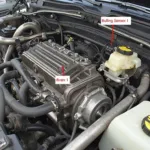In the ever-evolving automotive landscape, OBD2 scanners have become essential tools for both car enthusiasts and professional mechanics. With advancements in technology, Bluetooth OBD2 scanners have emerged as a popular alternative to their traditional wired counterparts. But are Bluetooth OBD2 scanners truly better? This comprehensive guide delves into the pros and cons of both types to help you make an informed decision.
Understanding OBD2 Scanners: A Quick Primer
Before we dive into the Bluetooth vs. traditional debate, let’s establish a basic understanding of OBD2 scanners. OBD2 stands for On-Board Diagnostics, Generation 2, a standardized system that allows external devices to access a vehicle’s diagnostic information. An OBD2 scanner, also known as a code reader, plugs into your car’s OBD2 port, typically located under the dashboard on the driver’s side.
Once connected, the scanner retrieves Diagnostic Trouble Codes (DTCs), which are essentially error codes stored in your car’s computer. These codes provide insights into potential issues affecting your vehicle’s engine, transmission, emissions, and other crucial systems.
Bluetooth OBD2 Scanners: Embracing Wireless Freedom
Bluetooth OBD2 scanners have gained immense popularity, and for a good reason. They offer a level of convenience and portability that traditional wired scanners simply can’t match.
Advantages of Bluetooth OBD2 Scanners:
- Wireless Connectivity: This is the most significant advantage. Bluetooth scanners transmit data wirelessly to your smartphone or tablet, eliminating the hassle of cables and limited reach.
- Portability: Their compact size and wireless nature make them incredibly portable. You can easily carry them in your glove box and use them anywhere, anytime.
- User-Friendly Apps: Most Bluetooth scanners pair with dedicated mobile apps that provide a user-friendly interface for reading and interpreting diagnostic data. These apps often include features like live data monitoring, graphing capabilities, and even repair suggestions.
- Affordability: Generally, Bluetooth OBD2 scanners tend to be more affordable than professional-grade wired scanners.
Disadvantages of Bluetooth OBD2 Scanners:
- Limited Functionality: While Bluetooth scanners are great for basic diagnostics, they may not offer the advanced features and functionalities of professional-grade wired scanners.
- App Dependency: The functionality and accuracy of a Bluetooth scanner are heavily reliant on the quality of the accompanying app.
- Compatibility Issues: Not all Bluetooth scanners are compatible with all vehicles or operating systems. It’s crucial to check compatibility before making a purchase.
Traditional OBD2 Scanners: The Wired Workhorses
Traditional OBD2 scanners, with their wired connections, have been the industry standard for a long time. They offer a level of reliability and functionality that Bluetooth scanners are still catching up to.
Advantages of Traditional OBD2 Scanners:
- Advanced Functionality: Professional-grade wired scanners often come equipped with a wide range of advanced features, including bidirectional communication (allowing you to control certain vehicle components), live data logging, and more.
- Reliability: The wired connection ensures a stable and reliable data stream, reducing the risk of connection drops or data loss.
- Compatibility: Wired scanners tend to be more universally compatible with a broader range of vehicle makes and models.
Disadvantages of Traditional OBD2 Scanners:
- Limited Portability: The wired connection restricts movement and portability.
- Bulkier Design: Traditional scanners are generally larger and bulkier than Bluetooth options.
- Higher Cost: Professional-grade wired scanners with advanced features can be significantly more expensive than basic Bluetooth models.
So, Are Bluetooth OBD2 Scanners Better?
The answer, as with many things in life, is: it depends.
Choose a Bluetooth OBD2 scanner if:
- You prioritize convenience and portability.
- You’re a car enthusiast looking for basic diagnostics and code clearing.
- You’re on a budget.
Choose a traditional OBD2 scanner if:
- You need advanced functionality for professional diagnostics and repairs.
- You require a reliable and stable connection for critical data logging.
- Budget is not a primary concern.
Choosing the Right OBD2 Scanner for Your Needs
Here are some factors to consider when choosing between a Bluetooth and a traditional OBD2 scanner:
- Your Budget: Bluetooth scanners offer a more budget-friendly option.
- Your Technical Expertise: If you’re a beginner, a Bluetooth scanner with a user-friendly app is a great starting point.
- Your Vehicle’s Make and Model: Check compatibility before purchasing any scanner.
- Your Diagnostic Needs: Define what you need the scanner to do. Are you looking to read and clear basic codes, or do you require advanced features?
Conclusion
Both Bluetooth and traditional OBD2 scanners have their pros and cons. The “better” option ultimately depends on your individual needs and preferences. By carefully considering the factors outlined in this guide, you can make an informed decision and choose the right OBD2 scanner that empowers you to take control of your vehicle’s diagnostics and maintenance.

